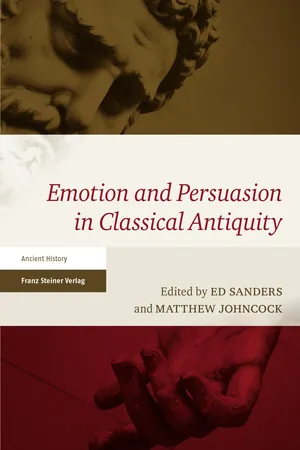
- 326 pages
- English
- PDF
- Available on iOS & Android
Emotion and Persuasion in Classical Antiquity
About this book
Appeal to emotion is a key technique of persuasion, ranked by Aristotle alongside logical reasoning and arguments from character. Although ancient philosophical discussions of it have been much researched, exploration of its practical use has focused largely on explicit appeals to a handful of emotions (anger, hatred, envy, pity) in 5th–4th century BCE Athenian courtroom oratory. This volume expands horizons: from an opening section focusing on so-far underexplored emotions and sub-genres of oratory in Classical Athens, its scope moves outwards generically, geographically, and chronologically through the "Greek East" to Rome.
Key thematic links are: the role of emotion in the formation of community identity; persuasive strategies in situations of unequal power; and linguistic formulae and genre-specific emotional persuasion. Other recurring themes include performance (rather than arousal) of emotions, the choice between emotional and rational argumentation, the emotions of gods, and a concern with a secondary "audience": the reader.
Frequently asked questions
- Essential is ideal for learners and professionals who enjoy exploring a wide range of subjects. Access the Essential Library with 800,000+ trusted titles and best-sellers across business, personal growth, and the humanities. Includes unlimited reading time and Standard Read Aloud voice.
- Complete: Perfect for advanced learners and researchers needing full, unrestricted access. Unlock 1.4M+ books across hundreds of subjects, including academic and specialized titles. The Complete Plan also includes advanced features like Premium Read Aloud and Research Assistant.
Please note we cannot support devices running on iOS 13 and Android 7 or earlier. Learn more about using the app.
Information
Table of contents
- CONTENTS
- ACKNOWLEDGMENTS
- ABBREVIATIONS
- CONTRIBUTORS
- INTRODUCTION
- PART I: EMOTION IN CLASSICAL GREEK ORATORY – NEW DIRECTIONS
- PART II: EMOTION AND THE FORMATION OF COMMUNITY IDENTITY
- PART III: PERSUASIVE STRATEGIES IN UNEQUAL POWER RELATIONSHIPS
- PART IV: LINGUISTIC FORMULAE AND GENRE-SPECIFIC PERSUASION
- GENERAL INDEX